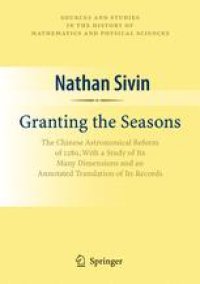
Ebook: Granting the Seasons: The Chinese Astronomical Reform of 1280, With a Study of its Many Dimensions and a Translation of its Records 授時暦叢考
Author: Nathan Sivin (auth.)
- Genre: Physics // Astronomy
- Tags: History of Mathematics, Astronomy
- Series: Sources and Studies in the History of Mathematics and Physical Sciences
- Year: 2009
- Publisher: Springer-Verlag New York
- Edition: 1
- Language: English
- pdf
China's most sophisticated system of computational astronomy was created for a Mongol emperor who could neither read nor write Chinese, to celebrate victory over China after forty years of devastating war. This book explains how and why, and reconstructs the observatory and the science that made it possible.
For two thousand years, a fundamental ritual of government was the emperor's "granting the seasons" to his people at the New Year by issuing an almanac containing an accurate lunisolar calendar. The high point of this tradition was the "Season-granting system" (Shou-shih li, 1280). Its treatise records detailed instructions for computing eclipses of the sun and moon and motions of the planets, based on a rich archive of observations, some ancient and some new.
Sivin, the West’s leading scholar of the Chinese sciences, not only recreates the project's cultural, political, bureaucratic, and personal dimensions, but translates the extensive treatise and explains every procedure in minimally technical language. The book contains many tables, illustrations, and aids to reference. It is clearly written for anyone who wants to understand the fundamental role of science in Chinese history. There is no comparable study of state science in any other early civilization.
China's most sophisticated system of computational astronomy was created for a Mongol emperor who could neither read nor write Chinese, to celebrate victory over China after forty years of devastating war. This book explains how and why, and reconstructs the observatory and the science that made it possible.
For two thousand years, a fundamental ritual of government was the emperor's "granting the seasons" to his people at the New Year by issuing an almanac containing an accurate lunisolar calendar. The high point of this tradition was the "Season-granting system" (Shou-shih li, 1280). Its treatise records detailed instructions for computing eclipses of the sun and moon and motions of the planets, based on a rich archive of observations, some ancient and some new.
Sivin, the West’s leading scholar of the Chinese sciences, not only recreates the project's cultural, political, bureaucratic, and personal dimensions, but translates the extensive treatise and explains every procedure in minimally technical language. The book contains many tables, illustrations, and aids to reference. It is clearly written for anyone who wants to understand the fundamental role of science in Chinese history. There is no comparable study of state science in any other early civilization.
China's most sophisticated system of computational astronomy was created for a Mongol emperor who could neither read nor write Chinese, to celebrate victory over China after forty years of devastating war. This book explains how and why, and reconstructs the observatory and the science that made it possible.
For two thousand years, a fundamental ritual of government was the emperor's "granting the seasons" to his people at the New Year by issuing an almanac containing an accurate lunisolar calendar. The high point of this tradition was the "Season-granting system" (Shou-shih li, 1280). Its treatise records detailed instructions for computing eclipses of the sun and moon and motions of the planets, based on a rich archive of observations, some ancient and some new.
Sivin, the West’s leading scholar of the Chinese sciences, not only recreates the project's cultural, political, bureaucratic, and personal dimensions, but translates the extensive treatise and explains every procedure in minimally technical language. The book contains many tables, illustrations, and aids to reference. It is clearly written for anyone who wants to understand the fundamental role of science in Chinese history. There is no comparable study of state science in any other early civilization.
Content:
Front Matter....Pages i-18
Astronomical Reform and Occupation Politics....Pages 19-33
Orientation....Pages 35-132
The Project: Origins and Process....Pages 133-150
The Astronomers....Pages 151-170
The Observatory and its Instruments....Pages 171-225
The Records....Pages 227-247
Evaluation of the Season-Granting System....Pages 249-310
Evaluation of the Season-Granting System, Part 2....Pages 311-388
Canon of the Season-Granting System, Part 1....Pages 389-485
Canon of the Season-Granting System, Part 2....Pages 487-550
Conclusion....Pages 551-559
Back Matter....Pages 561-664
China's most sophisticated system of computational astronomy was created for a Mongol emperor who could neither read nor write Chinese, to celebrate victory over China after forty years of devastating war. This book explains how and why, and reconstructs the observatory and the science that made it possible.
For two thousand years, a fundamental ritual of government was the emperor's "granting the seasons" to his people at the New Year by issuing an almanac containing an accurate lunisolar calendar. The high point of this tradition was the "Season-granting system" (Shou-shih li, 1280). Its treatise records detailed instructions for computing eclipses of the sun and moon and motions of the planets, based on a rich archive of observations, some ancient and some new.
Sivin, the West’s leading scholar of the Chinese sciences, not only recreates the project's cultural, political, bureaucratic, and personal dimensions, but translates the extensive treatise and explains every procedure in minimally technical language. The book contains many tables, illustrations, and aids to reference. It is clearly written for anyone who wants to understand the fundamental role of science in Chinese history. There is no comparable study of state science in any other early civilization.
Content:
Front Matter....Pages i-18
Astronomical Reform and Occupation Politics....Pages 19-33
Orientation....Pages 35-132
The Project: Origins and Process....Pages 133-150
The Astronomers....Pages 151-170
The Observatory and its Instruments....Pages 171-225
The Records....Pages 227-247
Evaluation of the Season-Granting System....Pages 249-310
Evaluation of the Season-Granting System, Part 2....Pages 311-388
Canon of the Season-Granting System, Part 1....Pages 389-485
Canon of the Season-Granting System, Part 2....Pages 487-550
Conclusion....Pages 551-559
Back Matter....Pages 561-664
....